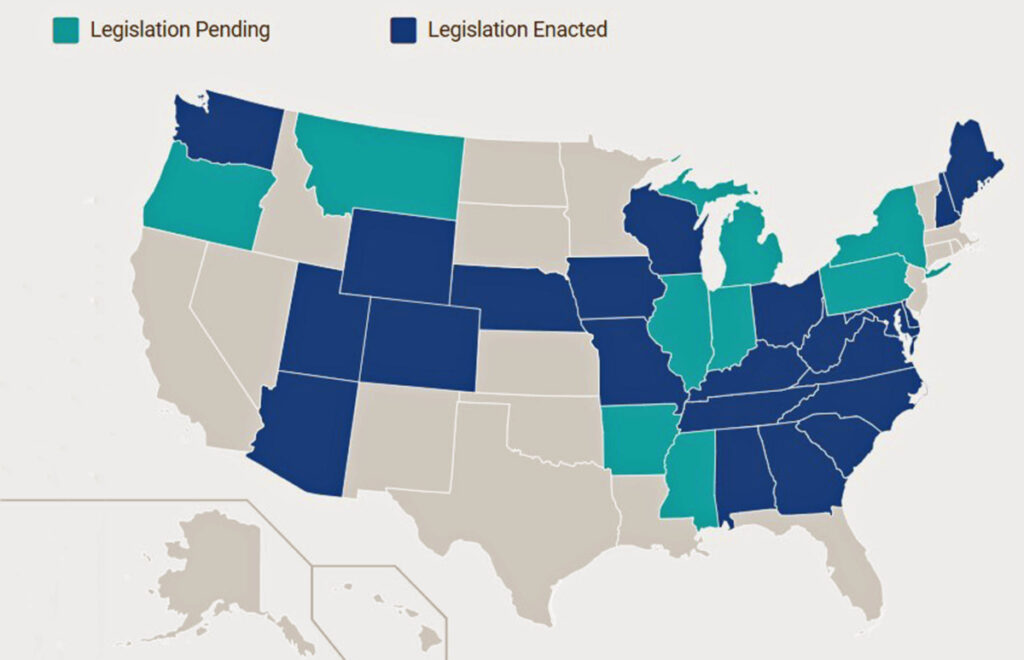Occupational therapists (OTs) and occupational therapy assistants (OTAs) who dream of practicing in multiple states may hesitate due to the cost and inconvenience of applying for licensure in each state of practice. The Occupational Therapy Licensure Compact (OT Compact) may help them realize this dream more easily and especially benefit occupational therapists living on state lines or wanting to pursue travel OT jobs. However, not all states have embraced this relatively new interstate compact. This guide lets you know which states have, which ones are thinking about it, and what it means for OTs nationwide.
What Is the Occupational Therapy Licensure Compact?
The OT Compact is a formal agreement that creates an interstate compact allowing the practice of occupational therapy between states. The joint initiative between the American Occupational Therapy Association (AOTA) and the National Board for Certification in Occupational Therapy (NBCOT) utilizes a mutual recognition model in which the OT/OTA’s home state license is mutually recognized by other states that are members of the Compact.
Previously, OTs and OTAs had to apply for individual state licenses to practice in multiple states and keep up with continuing education units (CEUs) and renewal requirements for each license. Holding multiple licenses was time-consuming and costly, making it challenging for OT/OTAs to practice across states.
Under the Occupational Therapy Licensure Compact, OTs and OTAs licensed in a Compact member state may practice in any other Compact member state under a Compact Privilege, the equivalent of a license. They must continue following standard licensure procedures in states that aren’t part of the Compact. However, the Compact hasn’t been fully launched.
The OT Compact Commission (OTCC) convened for the first time in August 2022 to adopt initial rules and bylaws to implement the Compact. The OTCC will also create an interstate licensure data system that offers rapid verification of an OT/OTA’s licensure standing and the ability to share disciplinary information between member states.
Compact Privilege applications weren’t open as of April 2023, but the OTCC was working to develop the infrastructure necessary to get the OT Compact operational. The Commission tentatively estimates applications to be available by mid-2024. However, states can become members of the Compact now by having their legislature enact the OT Compact language into law. As of July 2023, more than half the states have already joined the OT Compact.
How Do OT/OTAs Qualify for a Compact License?
To qualify for an OT Compact license, you must have your Occupational Therapists Registered (OTR) certification if you’re an occupational therapist or your Certified Occupational Therapist Assistant (COTA) certification if you’re an occupational therapist assistant. You must also have an active license in your home state, which must participate in the Compact agreement.
If you already hold an active license and have previously met all the initial state license requirements, you won’t need to complete additional fingerprinting or a background check. Your license must be in good standing, as most states require no disciplinary action against your license within the past two years. Once you’ve established your eligibility, you can purchase Compact Privileges in other member states.
Contact the OTCC to notify them of your intent to seek contact privilege in another member state and pay all fees required. Compact Privilege isn’t a multistate license. You must pay for a Compact Privilege in every state where you want to provide occupational therapy services.
If you don’t hold a current, active OT or OTA license, you must complete all the initial state-specific licensure requirements before applying for a compact privilege.
When it’s time to renew your state license, you only complete continuing education (CE) requirements in your state of residence. You don’t need to complete CE requirements in any Compact member state where you hold a Compact Privilege.

Source: Occupational Therapy Licensure Compact
Which States are Participating in the Occupational Therapy Compact?
States can participate in the Occupational Therapy Licensure Compact by enacting and passing state legislation through House and Senate bills. Depending on the state’s legislation and referral process, it can take several months or even years to enact legislation.
The following table lists the 28 states that have passed legislation to enact the OT Compact as of June 2023. Please note that some of the enactment dates are in the future, meaning legislation has passed, but the Compact hasn’t been fully enacted yet.
| State | Enacted Legislation Date |
| Alabama | March 8, 2022 |
| Arizona | April 6, 2022 |
| Arkansas | March 13, 2023 |
| Colorado | July 12, 2021 |
| Delaware | August 4, 2022 |
| Georgia | May 10, 2021 |
| Indiana | April 20, 2023 |
| Iowa | May 24, 2022 |
| Kentucky | April 8, 2022 |
| Louisiana | January 1, 2024 |
| Maine | June 22, 2021 |
| Maryland | April 13, 2021 |
| Mississippi | July 1, 2023 |
| Missouri | June 22, 2021 |
| Montana | May 2023 |
| Nebraska | April 19, 2022 |
| New Hampshire | August 18, 2022 |
| North Carolina | June 11, 2021 |
| Ohio | April 2, 2021 |
| South Carolina | May 13, 2022 |
| South Dakota | March 17, 2023 |
| Tennessee | April 19, 2022 |
| Utah | March 23, 2022 |
| Virginia | March 18, 2021 |
| Washington | March 24, 2022 |
| West Virginia | March 8, 2022 |
| Wisconsin | February 4, 2022 |
| Wyoming | March 11, 2022 |
While the OT compact is relatively new, many other healthcare professions have adopted similar interstate compact licensure agreements. For example, 40 states or U.S. territories have enacted the Enhanced Nurse Licensure Compact (eNLC) as of June 2023. The eNLC allows registered nurses to practice in multiple states using one interstate license.
Other professions, such as physical therapists, physicians and counselors, are also moving towards compact licensure. Multistate licensure is a giant step forward for the healthcare community and licensed healthcare professionals who would no longer need to obtain and maintain multiple single-state licenses.
RELATED: What’s the Difference Between the eNLC and the APRN Licensure Compacts?
States with Pending Legislation
Six states had pending legislation that could allow them to join the OT Compact as of June 2023. Those states include the following:
- Massachusetts: Senate Bill 187 and House Bill 352 hearings were scheduled for June 12, 2023. Both bills were first introduced on February 16, 2023.
- Michigan: House Bill 4169 was introduced and read in March 2023. There haven’t been any updates since the reading or any updates or creation of a Senate Bill as of mid-June 2023.
- New York: Assembly Bill A4342 was introduced in February 2023, but no further action has been taken since mid-June 2023. Senate Bill S6883 was reviewed by the Higher Education Committee, while Senate Bill S1228 addressing a model change was stricken in March 2023.
- Oregon: House Bill 2736 was reviewed in January 2023 and referred to the House Committee on Behavioral Health and Health Care. There weren’t any other scheduled future events as of mid-June 2023.
- Pennsylvania: House Bill 1329 was referred to Professional Licensure in mid-June 2023. At that time, a Senate bill had not been introduced.
- Texas: House Bill 1683 passed the House on May 2, 2023, was sent to the Senate on May 3, 2023, for the first reading and referred to the Committee on Health and Human Services on May 4, 2023 In March 2023, Senate Bill 1540 was introduced and referred to the Committee on Health & Human Services.
States with No Current or Pending Legislation
Sixteen states have no current or pending legislation. However, that doesn’t mean this won’t change in the near future. As of June 2023, the following states have no active legislation regarding the OT compact:
- Alaska
- California
- Connecticut
- Florida
- Hawaii
- Idaho
- Illinois
- Kansas
- Minnesota
- Nevada
- New Mexico
- New Jersey
- North Dakota
- Oklahoma
- Rhode Island
- Vermont
What Are the Advantages of the OT Licensure Compact?

The benefits of compact licensure impact not only the occupational therapist or occupational therapy assistant but also the state licensing board and healthcare consumers.
Benefits for the OT or OTA include:
- Reducing expenses by holding one compact license
- Ability to travel across state lines for travel or staff OT jobs
- Improving application processing wait times
- Increasing opportunity to find the best travel OT jobs to suit your needs
- Needing to only complete continuing education requirements for your state of residence
- Increasing the potential for higher OT salaries and OTA salaries
Benefits for the state licensing board include:
- Reducing application processing times
- Decreasing administrative costs and tasks
- Adding the ability to share license investigative information
- Increasing capability of upholding current state practice standards
- Creating a more robust standard of practice and safety regulations
Benefits to healthcare consumers include:
- Improving access to occupational therapy
- Increasing choice of preferred OT or OTA
- Enhancing the availability of care for underserved populations
- Improving patient care outcomes
Many states are choosing to become part of the OT licensure compact since they can easily share information and improve access to patient care. OTs and OTAs realize the benefits of obtaining a compact license, such as making it easier for them to relocate or accept travel OT or OTA positions. Thus, state licensing boards are recognizing the need, and state legislatures are pushing to act quickly.
Increase your earning potential by having the ability to practice across state lines and obtain your compact license as soon as you’re eligible. Search available OT or OTA staff and travel positions through our job board and take your career to the next level today.










I hold a license in good standing in Georgia (my home/original license, who has enacted the compact), and one in Washington (who has enacted the compact). Rather than renewing my Washington license, can I let it expire and then practice there under the compact (with my Georgia license)?
Hello Payton and thanks for reaching out. To practice through the Compact, you must have an approved “Privilege to Practice” application and pay a fee to the state where you wish to practice (Washington). Fees will vary by state, but the Privilege to Practice application hasn’t been opened yet. It’s anticipated to open in early 2025. If you wish to continue working in Washington, you’ll need to keep your license until this application process opens and you can apply for a Privilege to Practice in the state. Until then, be sure to keep your home state license in good standing to qualify for a Privilege to Practice in other Compact states. This site provides further details, including the link to where you can find the application when it becomes available: https://otcompact.org/practitioner-faq/compact-privilege-to-practice-status-update/.